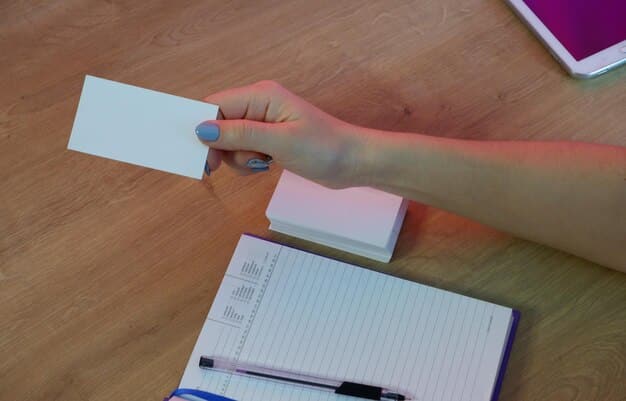Self-Testing: The Most Effective Exam Prep Method, According to Research

Self-testing, backed by research, is one of the most effective study techniques for exam preparation, as it enhances memory retention and improves understanding of the subject matter.
Are you looking for a study method that’s not only effective but also scientifically proven to boost your exam scores? Self-testing: The Most Effective Way to Prepare for Exams, According to Research, offers a powerful technique to enhance memory and grasp complex concepts.
The Science Behind Self-Testing
Self-testing, also known as retrieval practice, involves actively recalling information from memory rather than passively rereading notes or textbooks. This active recall process strengthens memory traces and improves long-term retention.
Research consistently demonstrates that self-testing is more effective than other common study methods, such as rereading and highlighting. This is because self-testing forces you to engage with the material in a deeper, more meaningful way.
Active Recall vs. Passive Review
The key difference between self-testing and passive review lies in the cognitive effort involved. Passive review, like rereading, requires minimal effort and can often lead to a false sense of familiarity with the material. Active recall, on the other hand, forces your brain to work harder to retrieve information, which strengthens neural connections and improves memory.
When you actively try to recall information, you’re not just passively absorbing it; you’re actively reconstructing it in your mind. This process of reconstruction helps you to understand the material more deeply and remember it for longer.
- Self-testing enhances long-term retention.
- It improves understanding of complex concepts.
- Self-testing reduces test anxiety by familiarizing you with the retrieval process.
In summary, self-testing is a powerful study technique that leverages the principles of active recall to improve memory, understanding, and exam performance. By actively engaging with the material, you can strengthen neural connections and enhance your ability to retrieve information when you need it most.
Implementing Self-Testing Effectively
To maximize the benefits of self-testing, it’s essential to implement it strategically. There are several techniques and strategies you can use to incorporate self-testing into your study routine.
Choosing the right methods and tools can significantly impact the effectiveness of your self-testing efforts. Let’s explore some practical ways to integrate this powerful technique into your study habits.
Using Flashcards for Self-Testing
Flashcards are a classic self-testing tool. Write a question or concept on one side of the card and the answer on the other. Quiz yourself regularly, focusing on the cards you struggle with most.
To make flashcards even more effective, use spaced repetition. This involves reviewing the cards at increasing intervals, revisiting the ones you find challenging more frequently and spacing out easier material.
Practice Questions and Quizzes
Practice questions and quizzes are excellent ways to simulate exam conditions and assess your understanding of the material. Look for past papers or create your own questions to test your knowledge.
Don’t just focus on getting the right answers; pay attention to the questions you get wrong. Analyze your mistakes and identify areas where you need to improve your understanding.

- Incorporate self-testing into your study routine from the beginning.
- Vary your self-testing methods to keep things interesting.
- Use self-testing to identify areas where you need to focus your studies.
By implementing self-testing effectively, you can transform your study habits and improve your exam performance. Experiment with different techniques and find the methods that work best for you.
Benefits of Self-Testing Beyond Exam Scores
While improved exam scores are a significant benefit, self-testing offers numerous other advantages that extend beyond academic performance. These benefits include enhanced metacognition, increased confidence, and reduced test anxiety.
Understanding these broader benefits can further motivate you to incorporate self-testing into your study routine and make it a lifelong learning habit.
Enhanced Metacognition
Metacognition is the awareness and understanding of your own thought processes. Self-testing promotes metacognition by forcing you to reflect on what you know and what you don’t know.
This self-awareness helps you to identify your strengths and weaknesses, allowing you to focus your study efforts more effectively. You’ll be better able to allocate your time and resources to the areas where you need the most improvement.
Increased Confidence
As you consistently test yourself and see improvement in your understanding and recall, your confidence will naturally increase. This boosted confidence can have a positive impact on your overall academic performance and well-being.
When you approach exams with greater confidence, you’re less likely to experience test anxiety and more likely to perform at your best. Confidence is not just about feeling good; it’s about having a realistic assessment of your abilities.
Self-testing helps in these ways:
- Self-testing improves problem-solving skills.
- It fosters a deeper understanding of the subject matter.
- Self-testing promotes long-term retention of knowledge.
Self-testing offers a wide array of benefits that extend far beyond improved exam scores. By enhancing metacognition, increasing confidence, and reducing test anxiety, self-testing can help you become a more effective and successful learner.
Common Mistakes to Avoid in Self-Testing
While self-testing is a powerful study technique, it’s easy to make mistakes that can diminish its effectiveness. Awareness of these common pitfalls can help you maximize the benefits of self-testing.
Avoiding these mistakes can ensure that you’re getting the most out of your self-testing efforts and achieving the best possible results. So, it’s good to be clear about these aspects.
Rereading Instead of Recalling
One of the biggest mistakes is simply rereading your notes or textbooks instead of actively trying to recall the information. Rereading can create a false sense of familiarity without strengthening memory.
The key to effective self-testing is to force yourself to retrieve the information from memory. Don’t rely on passive review; actively engage with the material.
Testing Too Soon After Learning
Testing yourself immediately after learning new material can also be less effective. Give your brain some time to consolidate the information before attempting to recall it.
Spaced repetition, where you review the material at increasing intervals, has been shown to improve long-term retention. Start with short intervals and gradually increase the time between self-testing sessions.

- Failing to analyze mistakes made during self-testing
- Not using varied self-testing methods
- Neglecting to incorporate feedback into your studying
By being mindful of these common mistakes, you can avoid these traps and enhance the effectiveness of your self-testing efforts. The proper self-testing approach will always result in a more successful outcome.
Tailoring Self-Testing to Different Subjects
Self-testing isn’t a one-size-fits-all approach. The most effective self-testing strategies may vary depending on the subject matter. Tailoring your self-testing methods to the specific demands of each subject can significantly enhance your learning outcomes.
Understanding how to adapt your self-testing techniques to different subjects can help you become a more versatile and effective learner.
Math and Science
For math and science subjects, focus on problem-solving and application. Work through practice problems and try to explain the underlying concepts in your own words.
Don’t just memorize formulas; understand how they are derived and when to apply them. Self-testing in these subjects should involve actively solving problems and explaining the reasoning behind your solutions.
Humanities and Social Sciences
In humanities and social sciences, focus on understanding key concepts and their relationships. Use self-testing to recall important facts, figures, and events.
Try to explain the material to someone else, or write summaries from memory. Self-testing in these subjects should involve actively recalling and explaining information.
- Adapting self-testing for language learning
- For medical and legal studies, focus on case studies and applications
- Self-testing across different learning styles
By tailoring your self-testing methods to the specific demands of each subject, you can optimize your learning outcomes and become a more effective and adaptable learner. A few simple adjustments to your study habits can be quite valuable.
Making Self-Testing a Habit
The real power of self-testing is unlocked when it becomes a consistent habit. Integrating self-testing into your daily or weekly study routine can lead to long-term improvements in memory, understanding, and exam performance.
Turning self-testing into a habit requires planning, consistency, and a willingness to experiment with different techniques. But here’s the secret!
Setting Realistic Goals
Start by setting realistic goals for how often you’ll self-test. Don’t try to overhaul your entire study routine overnight. Begin with small, manageable changes that you can easily stick to.
For example, aim to self-test for 15-30 minutes each day or dedicate one or two study sessions per week specifically to self-testing activities.
Tracking Your Progress
Keep track of your self-testing efforts and monitor your progress over time. This can help you stay motivated and identify areas where you need to adjust your approach.
Use a study journal, a spreadsheet, or a dedicated app to track your self-testing sessions, your scores on practice quizzes, and your overall improvement in understanding the material.
- Tips for staying consistent in your self-testing routine
- Adjust and optimize your self-testing routine over time
- Incorporate self-testing into group study
By making self-testing a habit, you can unlock its full potential as a powerful study technique. With consistent effort and a willingness to adapt, you can transform your study habits and achieve your academic goals.
| Key Point | Brief Description |
|---|---|
| 🧠 Active Recall | Self-testing uses active recall to strengthen memory more effectively than passive review. |
| ⏱️ Spaced Repetition | Reviewing material at increasing intervals improves long-term retention. |
| 🎯 Tailoring Methods | Adapt self-testing methods to the subject for optimal results. |
| 📈 Consistency | Make self-testing a regular habit for lasting benefits. |
Frequently Asked Questions
▼
Self-testing, also known as retrieval practice, involves actively recalling information from memory. This process strengthens memory traces and improves long-term retention, outperforming passive review methods.
▼
The frequency of self-testing depends on the material and your schedule, but regular, spaced repetition is key. Start with shorter intervals and gradually increase the time between sessions as you master the content.
▼
Effective techniques include using flashcards, answering practice questions, and explaining concepts out loud from memory. Vary your methods to keep things interesting and challenge your recall in different ways.
▼
Yes, self-testing can reduce test anxiety by familiarizing you with the retrieval process and building confidence in your ability to recall information under pressure, leading to better exam performance.
▼
Self-testing can be adapted to various subjects. Tailor your self-testing methods to the specific demands of each subject for optimal learning outcomes, focusing on problem-solving in math and concept recall in humanities.
Conclusion
In conclusion, self-testing: The Most Effective Way to Prepare for Exams, According to Research, is more than just a study technique; it’s a proven strategy for enhancing memory, understanding, and academic performance. By incorporating self-testing into your study routine, you can transform your learning habits and unlock your full potential.





